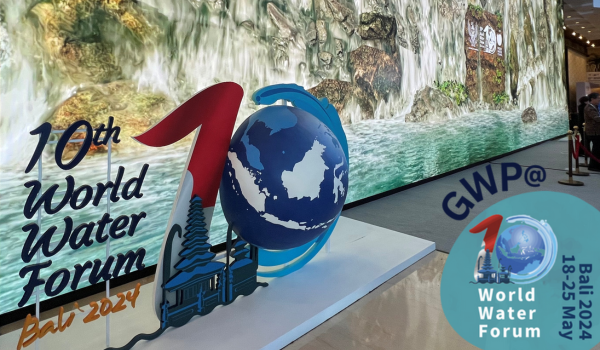GWP highlights | Sunday | Monday | Tuesday | Wednesday | Thursday | Friday
The 10th World Water Forum took place in Bali, Indonesia on 18-25 May under the theme ‘Water for Shared Prosperity’ in line with ‘Water for Peace’ - a current hot and relevant topic throughout the global water community and the theme of this year’s World Water Day.
Recognising water as a fundamental pillar of shared prosperity and global security and essential to the future we want to build, GWP was on-site with a carefully selected delegation spanning its Global Secretariat, Regions, Countries and Steering Committee, led by GWP’s new Executive Secretary and CEO, Alan AtKisson. Several individuals from our global, dedicated GWP Network made their way to Bali in other capacities but performed roles wearing their ‘GWP global hats’ and supporting our mission throughout the week – underscoring the reach of our global network.
The GWP delegation engaged in the Forum through a week full of inspirational thematic sessions, high-level panels, speeches, and side discussions – on stage, in informal settings, and of bilateral nature. Having shared our key statements on water security, water investments, peacebuilding through collaborating on shared waters, and much, much more, we also leave Bali with new thoughts and ideas, and – as AtKisson puts it – “if not commitments then at least possibilities for what we can do together to advance the vision of water security.”
It goes without saying that advancing the vision of water security needs to happen with a significant degree of urgency. AtKisson explains:
“The key to a prosperous future is managing our shared water resources in a way that meets economic objectives, social needs and environmental imperatives, in the face of a changing climate. While this may seem daunting, we actually have a tried and trusted recipe to achieve those objectives. The good news is it’s not a new target either, but one that all UN Member States have already committed to: implementing integrated water resources management, or SDG target 6.5.”
Some of GWP’s highlights from the Forum:
AtKisson kicked off his presence at the Forum by addressing the High-level Experts and Leaders Panel (HELP) on Water and Disasters, discussing the importance of good water management for disaster risk reduction (DRR), including the benefits of grey and green infrastructure.
In particular, AtKisson stressed the need for investments: “The word that I keep bringing up is investing – in order to ensure we have the future we want for water security and global security.”
Monday 20 May
On Monday, a larger part of the delegation had found its way to Bali, which gave GWP the opportunity to partake in many sessions, high-level panels and side-events, on a number of different topics – such asearly warning systems, water justice and fair water allocation, transboundary water cooperation, water investments for Africa, and water cooperation for the SDGs beyond SDG 6.
GWP signed an MoU with the Publicity and Education Centre (PEC) of the Ministry of Water Resources of China to strengthen the relationship between the two and promote mutual learning in international exchanges on water education and water culture. The MoU was signed by AtKisson and PEC’s Director, Wang Houjun.
“GWP has a long history of extensive cooperation with China on water resources management issues. This is a new signal and chapter in that story and we’re looking forward to developing it further,” AtKisson said.
GWP’s Chair of Regional Chairs, and Regional Chair of GWP West Africa, Abdoulaye Sene, was interviewed on water security and the Forum by Senegalese TV (in French, starting from 9:45).
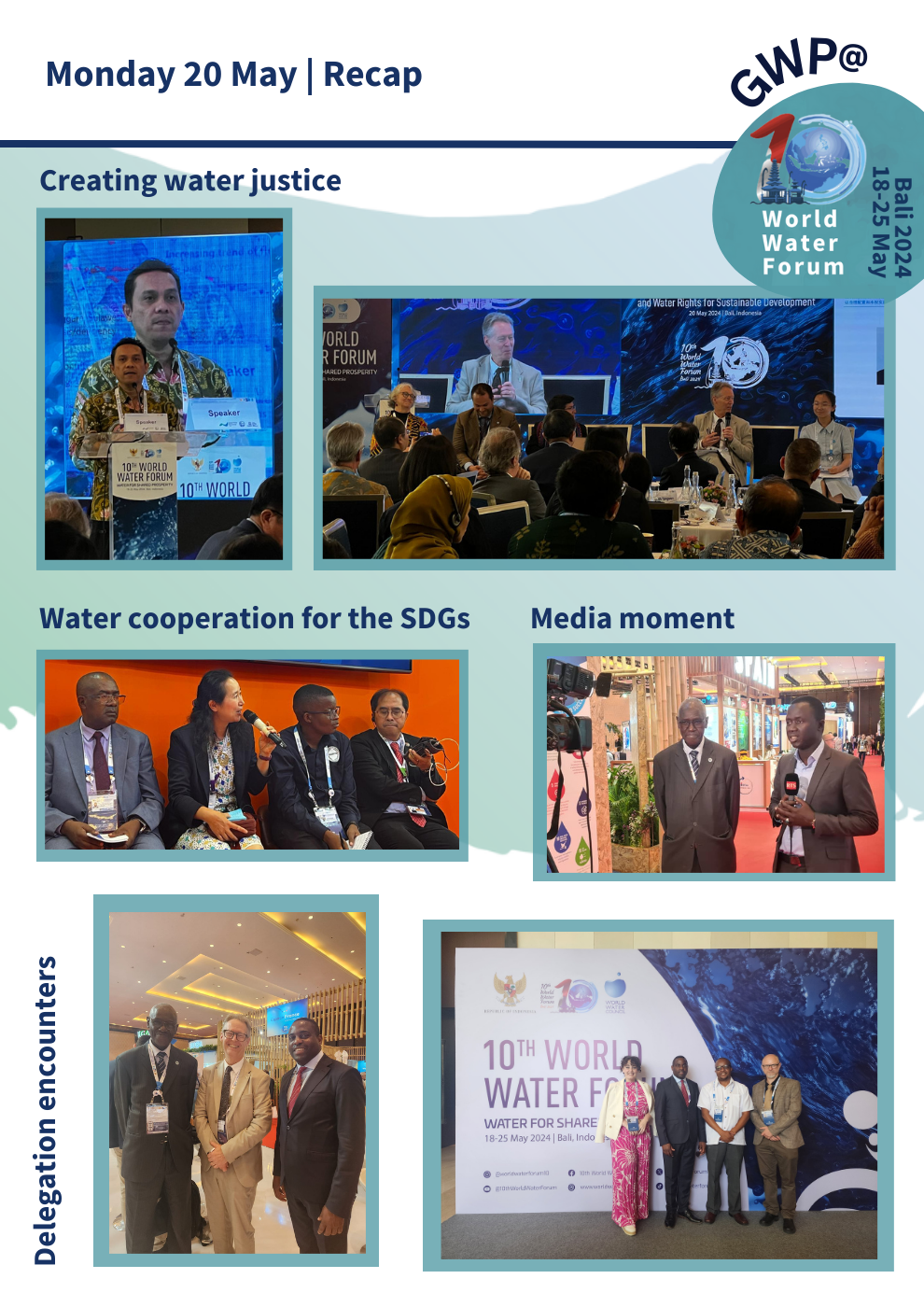
Tuesday 21 May
Tuesday was another impactful day for GWP’s delegation.
The Continental Africa Water Investment Programme (AIP), GWP Southern Africa, and the International High-Level Panel on Water Investments for Africa supported the African Union Commission in convening a special session on water investments for Africa to urge Global Leaders to close Africa’s water investment gap through mobilising an additional US$30 billion per year. The event was moderated by GWP Southern Africa Executive Secretary & AIP CEO, Alex Simalabwi,
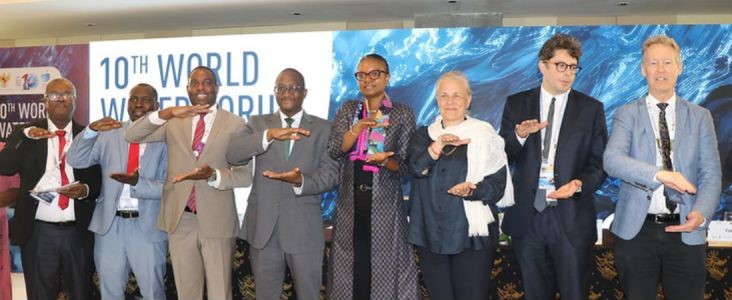
How big is Africa’s water investment gap? GWP Southern Africa Executive Secretary & AIP CEO, Alex Simalabwi, third from the left, and GWP Executive Secretary & CEO, Alan AtKisson, furthest to the right, together with Partners urge African and global leaders to mind the water investment gap across the African continent.
GWP Southeast Asia’s Chair, Christopher Ilagan, gave the opening remarks in a session on scaling up smart water management solutionsfor sustainability and shared prosperity across Southeast Asia.
Kicking off the Bandung Spirit Water Summit, AtKisson participated in a High-Level Panel on Water and Peace, delving into water diplomacy for peacebuilding in a contemporary setting, while drawing on the history of Afro-Asian economic and cultural cooperation and the Bandung Conference of 1955.
Reiterating his message from this year’s World Water Day, AtKisson stated: “No global security without water security, no water security without investing in water.”
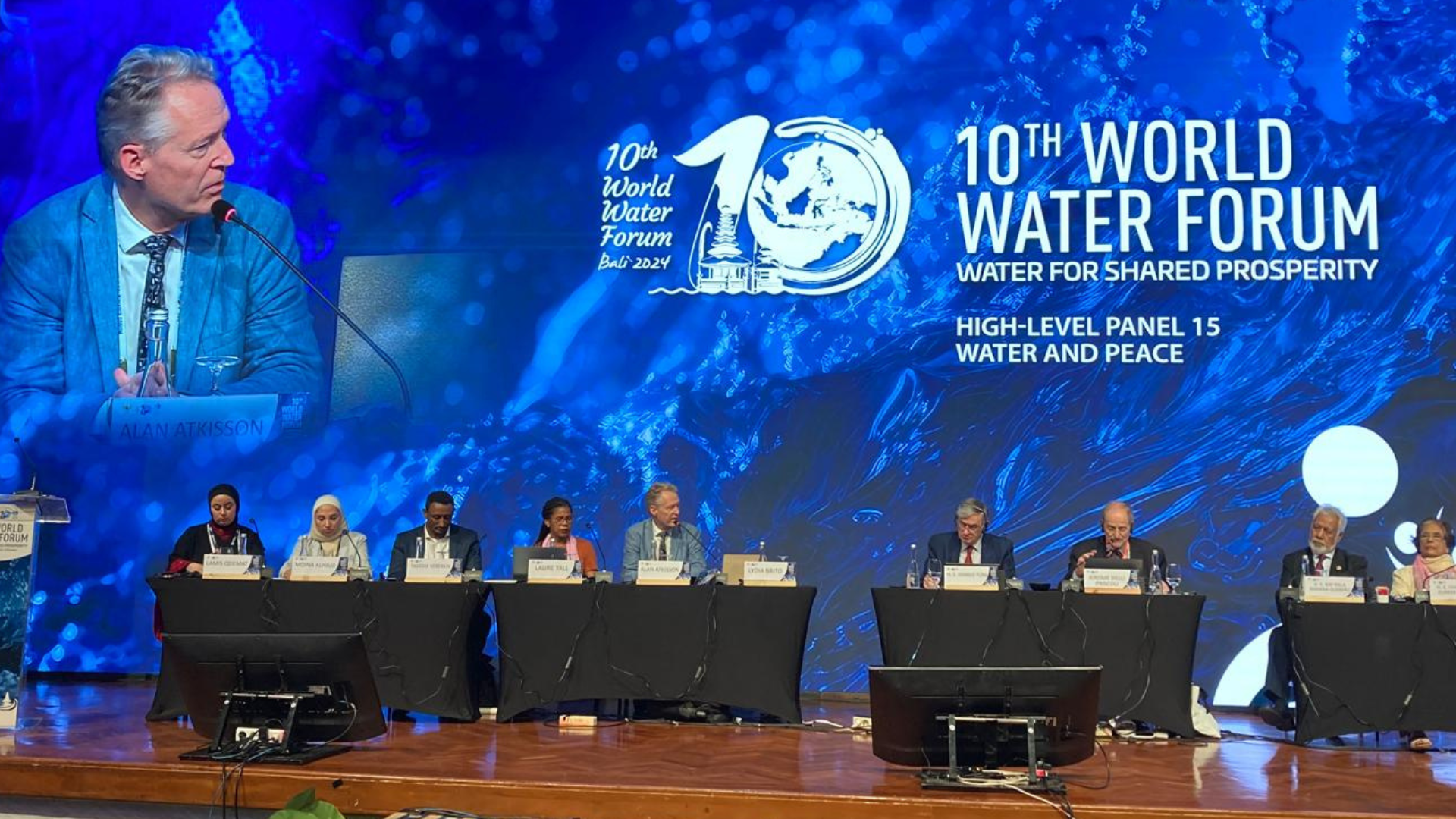
Wednesday 22 May
On Wednesday, our colleagues from GWP Southeast Asia started out the day in the China Pavilion supporting China Water in launchingchildren’s books on water. Later in the day they led a regional session on ‘Finance for inclusive/green and climate resilience services’, as the pinnacle of the Southeast Asia regional process leading towards the Forum, coordinated by the GWP regional team.
Meanwhile, Executive Secretary of GWP Southern Africa, Alex Simalabwi, was a speaker on the session on the midterm comprehensive review of the 2018-2028 Water Action Decade, following up on the 2023 UN Water Conference, to foster greater commitment towards water action in the build-up to the 2026 and 2028 Conferences.
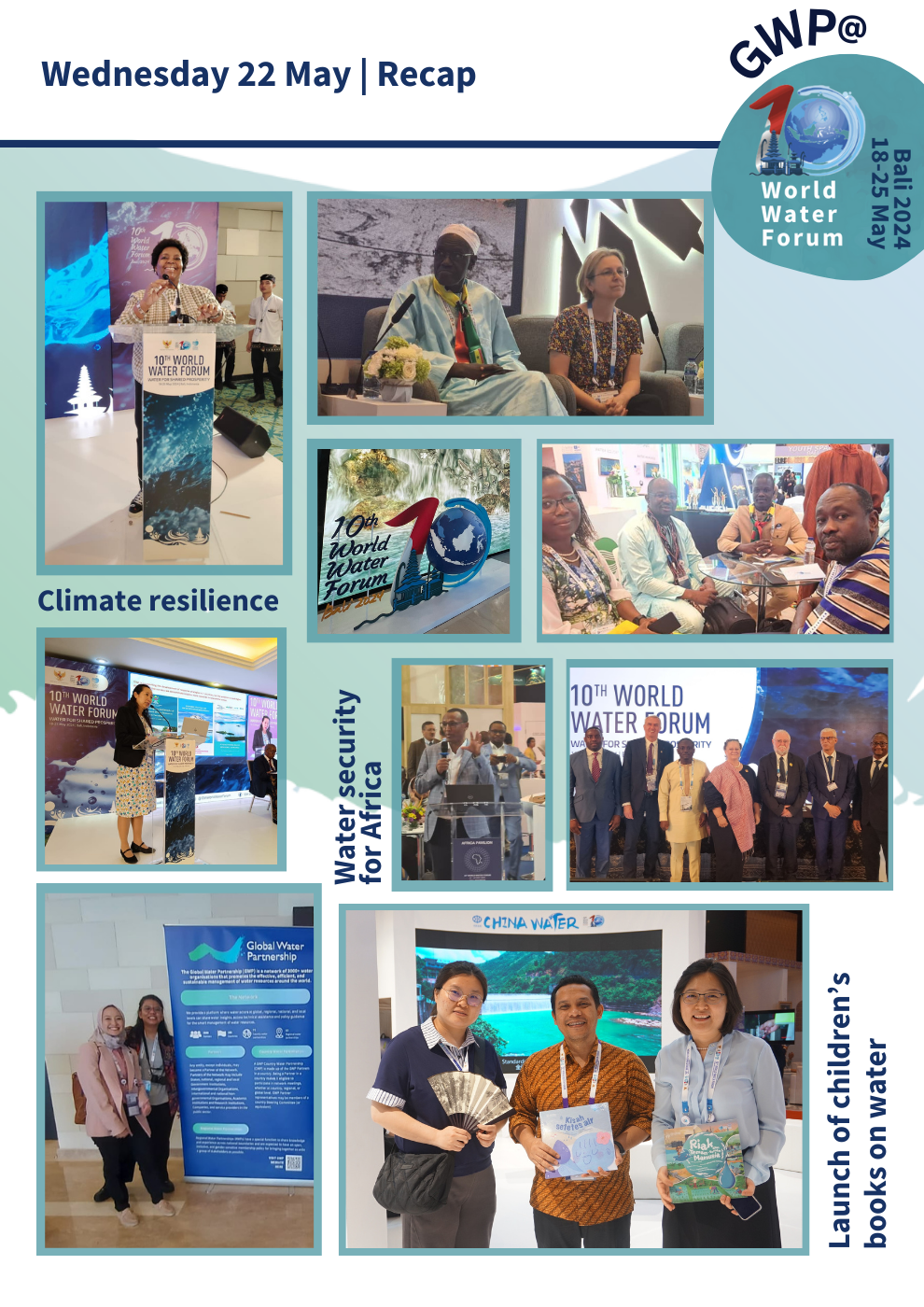
Thursday 23 May
GWP’s engagement on Thursday highlighted not only the need for but also a broad willingness to build Partnerships across the water community to achieve the overarching goal of shared prosperity and a water secure world.
GWP’s delegation met with the Indonesia Water Coalition and the International Drought Resilience Alliance (IDRA), and at a session on ‘New Intervention and Integrative Approaches for Solving Complex Challenges’, Youth Expert and Programme Officer for GWP South Asia, Raunak Shrestha, said the following on inter- and intragenerational partnerships:
“Meaningful inclusion of youth in water through co-creation of solutions creates spaces for inter- and intragenerational partnerships, leading to innovative approaches in tackling complex water challenges”.
On transboundary partnerships, GWP Transboundary expert Yumiko Yasuda stated: ”The four key enabling factors for multi-stakeholder dialogues are inclusion and role of facilitators; using existing regional political and economic processes; fostering learning across scales; and leveraging sustainable finance.” Learn more about exactly that in GWP’s 2023 publication: Multi-stakeholder regional dialogues Pathways for advancing transboundary water cooperation.
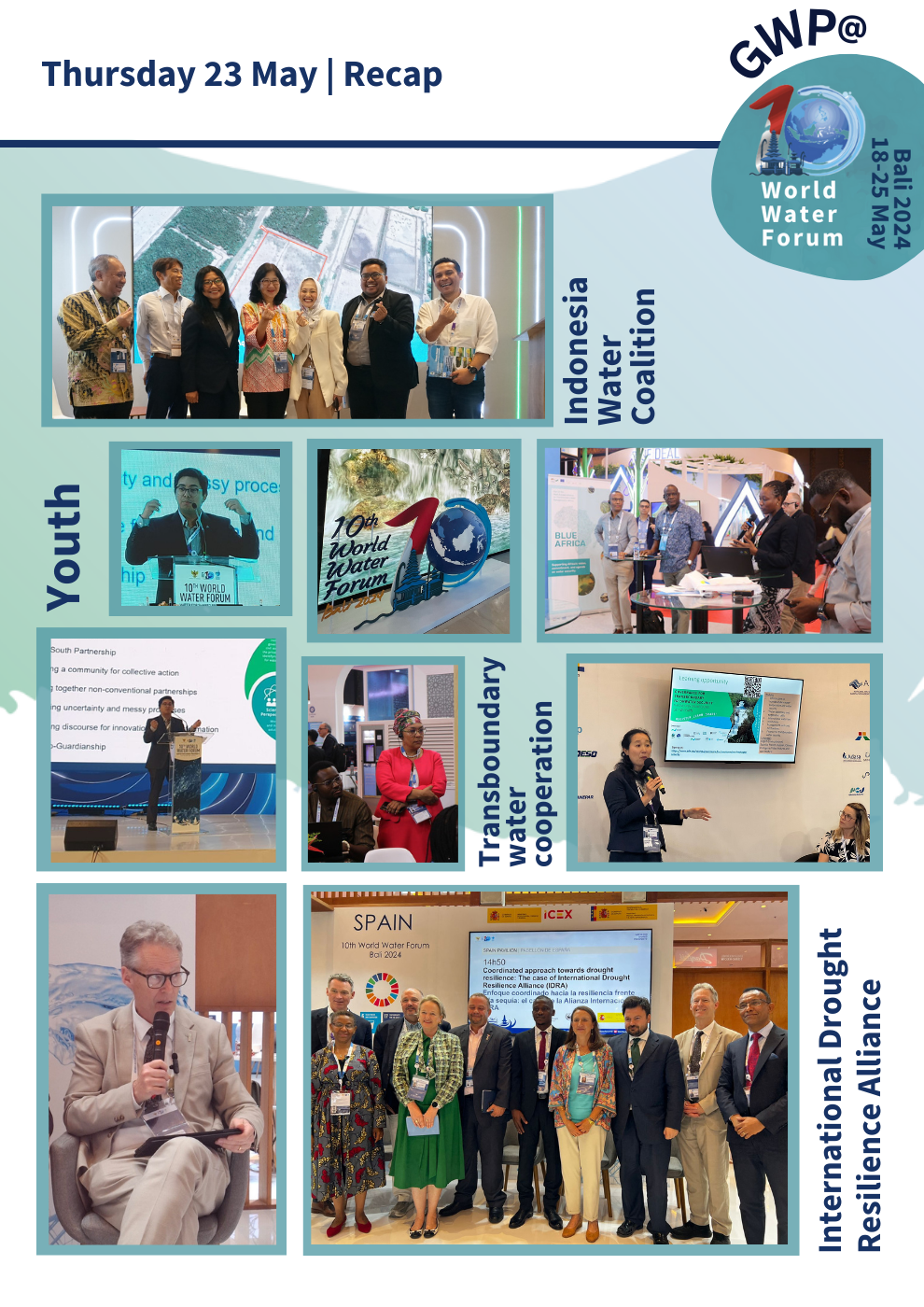
Friday 24 May
While most of GWP’s delegation had left the Forum by Friday, our transboundary specialist Yumiko Yasuda was still on-site and took part in a fruitful discussion on water investments and ‘Optimising the finance, governance, capacity building, and institutional arrangements needed to reduce water-related disaster risk’ with prominent speakers, including Executive Director of the Global Commission for Water (and previous Water Envoy for the Netherlands) Henk Ovink.
And thus the end of the Forum allowed the need for investment to be brought back to the forefront, pointing back to AtKisson’s message from his first day: Only through investing can we reach shared prosperity and ensure we have the future we want for water security and global security.
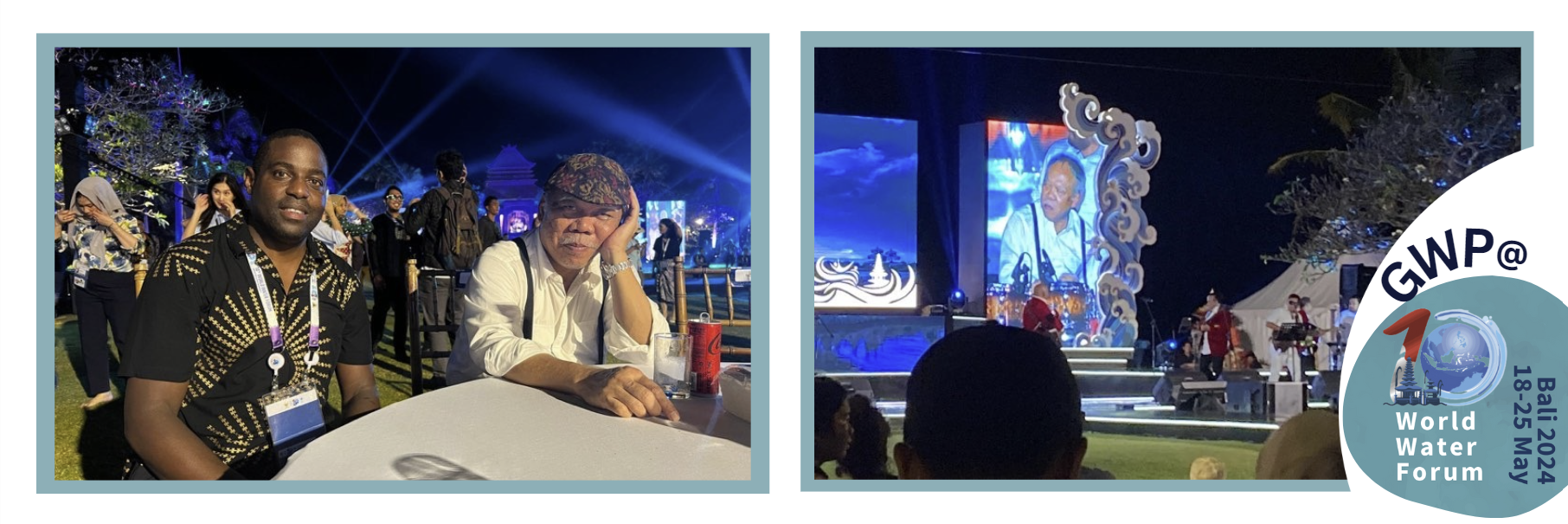
Caption: GWP Southern Africa's Alex Simalabwi together with Basuki Hadimuljono, Minister of Public Works and Public Housing, Indonesia and host of the 10th Word Water Forum. The Forum closed with a musical celebration.
The World Water Forum is a significant meeting place for the water community. Despite its non-binding nature, its main outcomes, including a ministerial declaration, are often steppingstones towards official UN processes. However, perhaps the main impact of GWP’s involvement in the Forum can really be measured in the many formal and informal agreements, the strengthening of existing relationshipsand the building of new ones, and the future concrete collaborations that can be derived from bringing together important water stakeholders. In that respect, like any water event, the Forum should be seen as a milestone in a much longer process, in which the many GWP activities throughout the week served to successfully grow the sustainable partnerships needed to drive progress towards achieving the vision of a water secure world.

